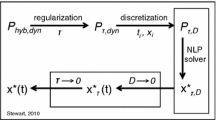Abstract
In this paper, a Newton-conjugate gradient (CG) augmented Lagrangian method is proposed for solving the path constrained dynamic process optimization problems. The path constraints are simplified as a single final time constraint by using a novel constraint aggregation function. Then, a control vector parameterization (CVP) approach is applied to convert the constraints simplified dynamic optimization problem into a nonlinear programming (NLP) problem with inequality constraints. By constructing an augmented Lagrangian function, the inequality constraints are introduced into the augmented objective function, and a box constrained NLP problem is generated. Then, a linear search Newton-CG approach, also known as truncated Newton (TN) approach, is applied to solve the problem. By constructing the Hamiltonian functions of objective and constraint functions, two adjoint systems are generated to calculate the gradients which are needed in the process of NLP solution. Simulation examples demonstrate the effectiveness of the algorithm.
Similar content being viewed by others
References
J. Nocedal, S. Wright. Numerical Optimization. New York: Springer-Verlag, 2006.
A. M. Rubinov, X. Yang, B. M. Glover. Extended Lagrange and penalty functions in optimization. Journal of Optimization Theory and Applications, 2001, 111(2): 381–405.
K. L. Teo. A Unified Computational Approach to Optimal Control Problems. New York: Longman Scientific & Technical, 1991.
W. W. Hager, H. Zhang. Algorithm 851: CG DESCENT, a conjugate gradient method with guaranteed descent. ACM Transactions on Mathematical Software, 2006, 32(1): 113–137.
S. G. Nash. A survey of truncated-Newton methods. Journal of Computational and Applied Mathematics, 2000, 124(1/2): 45–59.
E. G. Birgin, J. M. Martłnez. Structured minimal-memory inexact quasi-Newton method and secant preconditioners for augmented Lagrangian optimization. Computational Optimization and Applications, 2008, 39(1): 1–16.
F. Facchinei, G. Liuzzi, S. Lucidi. A truncated Newton method for the solution of large-scale inequality constrained minimization problems. Computational Optimization and Applications, 2003, 25(1): 85–122.
G. Di Pillo, G. Liuzzi, S. Lucidi, et al. A truncated Newton method in an augmented Lagrangian framework for nonlinear programming. Computational Optimization and Applications, 2010, 45(2): 311–352.
K. F. Bloss, L. T. Biegler, W. E. Schiesser. Dynamic process optimization through adjoint formulations and constraint aggregation. Industrial & Engineering Chemistry Research, 1998, 38(2): 421–432.
N. M. K. Poon, J. R. R. A. Martins. An adaptive approach to constraint aggregation using adjoint sensitivity analysis. Structural and Multidisciplinary Optimization, 2007, 34(1): 61–73.
G. Kreisselmeier, R. Steinhauser. Systematic control design by optimizing a vector performance indicator. Proceedings of the IFAC Symposium on Computer-Aided Design of Control Systems. Zurich, Switzerland, 1979: 113 - 117.
C. G. Raspantia, J. A. Bandoni, L. T. Biegler. New strategies for flexibility analysis and design under uncertainty. Computers & Chemical Engineering, 2000, 24(9/10): 2193–2209.
K. Zhou, J. Doyle, K. Glover. Robust and Optimal Control. Englewood Cliffs: Prentice Hall, 1996.
S. G. Nash, J. Nocedal. A numerical study of the limited memory BFGS method and the truncated-newton method for large scale optimization. SIAM Journal on Optimization, 1991, 1(3): 358–372.
G. Fasano. Conjugate gradient (CG)-type method for the solution of Newton’s equation within optimization frameworks. Optimization Methods and Software, 2004, 19(3/4): 267–290.
W. H. Ray. Advanced Process Control. New York: McGraw-Hill, 1981.
E. F. Carrasco, J. R. Banga. A hybrid method for the optimal control of chemical processes. UKACC International Conference on Control. Edison, NJ: Institution of Electrical Engineers, INSPEC, 1998: 925–930.
Author information
Authors and Affiliations
Corresponding author
Additional information
This work was supported by the Natural Science Foundation of China (No. 60974039) and the National Science and Technology Major Project (No. 2008ZX05011).
Qiang ZHANG is a Ph.D. candidate at the College of Information and Control Engineering, China University of Petroluem (East China). His major research interests are optimal control theory and the related applications in reservoir recovery and chemical engineering.
Shurong LI received his B.S. degree from Shandong University in 1987. He later obtained his M.S. and Ph.D. degrees from the Institute of Systems Science, Chinese Academy of Sciences, in 1990 and 1993, respectively. He finished his postdoctoral research at Tsinghua University in 1995. Currently, he is a professor of the China University of Petroleum (East China). His recent research interests include optimal control and optimization, nonlinear control, and intelligent control.
Yang LEI is a Ph.D. candidate at the College of Information and Control Engineering, China University of Petroleum (East China). His major research interests are optimal control theory and the related applications in reservoir recovery.
Xiaodong ZHANG received his Ph.D. degree in Chemical Engineering and Technology from the China University of Petroleum (East China) in 2009. Currently, he is a lecturer at the China University of Petroleum (East China). His research interests include optimal control, nonlinear programming, and oil reservoir numerical simulation.
Rights and permissions
About this article
Cite this article
Zhang, Q., Li, S., Lei, Y. et al. Newton-conjugate gradient (CG) augmented Lagrangian method for path constrained dynamic process optimization. J. Control Theory Appl. 10, 223–228 (2012). https://doi.org/10.1007/s11768-012-0032-z
Received:
Revised:
Published:
Issue Date:
DOI: https://doi.org/10.1007/s11768-012-0032-z




